

INTENSE STUDY TIPS. Boy oh boy....
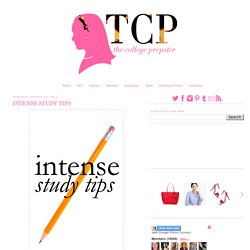
I'm going to attempt to get all of my study tips from the past and present into this post. I've been getting emails/tweets/questions asking for my secrets. How To Learn More Outside Of Class Than You Ever Could Inside It. I’m going to give you a list of seemingly random things, and I want to you try and guess how they’re related.
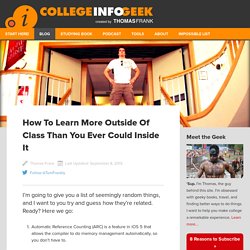
Ready? Here we go: Automatic Reference Counting (ARC) is a feature in iOS 5 that allows the compiler to do memory management automatically, so you don’t have to.Out of all high school students that graduate in the bottom 40 percent of their class, 76 percent will not will not have a college degree within eight years.しんぶんでしたか? Learn Anything in 20 Hours with This Four Step Method. The lesson you never got taught in school: How to learn! A paper published in Psychological Science in the Public Interest evaluated ten techniques for improving learning, ranging from mnemonics to highlighting and came to some surprising conclusions.
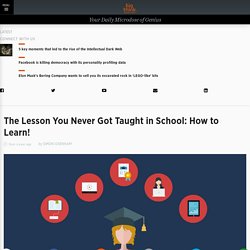
The report is quite a heavy document so I’ve summarised the techniques below based on the conclusions of the report regarding effectiveness of each technique. Learning on Steroids - Implement Rapid Learning Tactics. Learn Faster, Study Less!
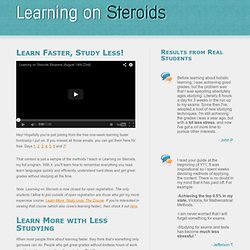
Hey! Hopefully you're just joining from the free one-week learning faster bootcamp I put on. Learn Faster with the Feynman Technique. How to Learn a Little Every Day. Something can be said for knowing a little bit about a lot of things.
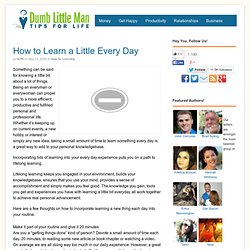
Being an everyman or everywoman can propel you to a more efficient, productive and fulfilled personal and professional life. Whether it’s keeping up on current events, a new hobby or interest or simply any new idea, taking a small amount of time to learn something every day is a great way to add to your personal knowledgebase.
Incorporating bits of learning into your every day experience puts you on a path to lifelong learning. Lifelong learning keeps you engaged in your environment, builds your knowledgebase, ensures that you use your mind, provides a sense of accomplishment and simply makes you feel good. The knowledge you gain, tools you get and experiences you have with learning a little bit everyday all work together to achieve real personal advancement. Learn Something New Every Day. Books.Blog – Skip Graduate School, Save $32,000, Do This Instead.
Three years ago, I invested $32,000 and the better part of two years at the University of Washington for a master's degree in International Studies.
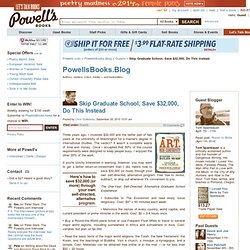
The verdict? It wasn't a complete waste of time and money. How to learn about everything? How to retain 90% of everything you learn. Imagine if you had a bucket of water.
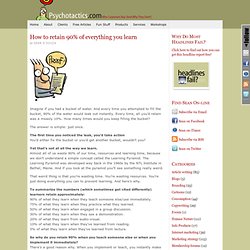
And every time you attempted to fill the bucket, 90% of the water would leak out instantly. Every time, all you’d retain was a measly 10%. How many times would you keep filling the bucket? How To Learn (Absolutely Anything and Everything) A while back I mentioned, in passing, that I want to tour Route 66 in the US next year on a bicycle. I’ve never done a long bike tour, but ever since mentioning it I’ve had it in the back of my mind. The first thing I know is that it’s going to be difficult. :) But I was more worried about the bike.
Due to my traveling I want to get a bike when I get back to the States in October which I can then take with me wherever I decide to go next. (Not so secret where that is, but I’m still not 100% decided, so I’ll just leave it at that!) The Goal of Learning Everything. Recently, I wrote about my goal of learning everything.
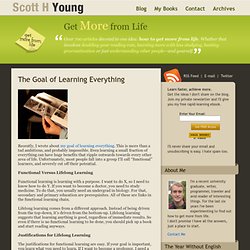
Septivium - Learn about everything. How to Learn About Everything. The internet almost makes it too easy My recent post “How to Understand Everything (and Why)” discussed an untaught, integrative kind of knowledge, and why it is so important in science and engineering — how it can leverage specialized knowledge and improve the trade-off between bold innovation and costly blunders.
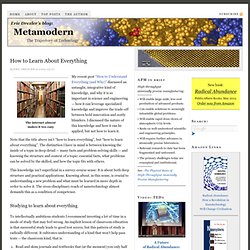
I discussed the nature of this knowledge and how it can be applied, but not how to learn it. Note that the title above isn’t “how to learn everything”, but “how to learn about everything”. The distinction I have in mind is between knowing the inside of a topic in deep detail — many facts and problem-solving skills — and knowing the structure and context of a topic: essential facts, what problems can be solved by the skilled, and how the topic fits with others. This knowledge isn’t superficial in a survey-course sense: It is about both deep structure and practical applications.
Studying to learn about everything. 3 Ways to Teach Yourself Anything You Want to Learn. If you look closely at people who are succeeding in this new digital world of work, you’ll notice they have something in common: they’re fast learners and willing to adapt.
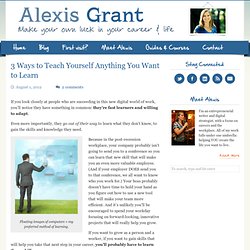
Even more importantly, they go out of their way to learn what they don’t know, to gain the skills and knowledge they need. Coursera Throws a 'Massive Open Cookout' - Technology. By Jeffrey R. Young Menlo Park, Calif. Are You Ready To Be Lucky? We’re at an interesting crossroads in terms of careers. We still want them, but they don’t exist anymore. In the US, the typical job tenure is now 4 years, with most workers cycling through about 11 jobs in their lifetime.* If the 20th-century career was a ladder that we climbed from one predictable rung to the next, the 21st-century career is more like a broad rock face that we are all free climbing.
Isaac Asimov on Creativity in Education & The Future of Science. 9 Tactics for Rapid Learning (That Most People Have Never Heard Of) Whenever the subject of why some people learn faster comes up, I get a whole host of common answers: Some people are just naturally smart.
(Often implying you can’t improve)Everyone is “smart” in their own way. (Nonsense, research indicates different “intelligences” often correlate)IQ is all in the genes. (Except IQ changes with age and IQ tests can be studied for, like any other test) Anarchistic free school. Unschooling. Philosophy[edit] Children are natural learners[edit] Student-centred learning.
Student-centered learning, that is, putting students interests first, is in contrast to traditional education, by proponents of "student-centered learning" also dubbed "teacher-centred learning". Student-centred learning is focused on each student's interests, abilities, and learning styles, placing the teacher as a facilitator of learning. This classroom teaching method acknowledges student voice as central to the learning experience for every learner, and differs from many other learning methodologies. Autodidacticism. "Self-taught" redirects here. For the hip hop group, see Self Taught. Autodidacticism (also autodidactism) or self-education (also self-learning and self-teaching) is the education without the guidance of masters (such as teachers and professors) or institutions. Generally, an autodidact is an individual who chooses the subject they will study, their studying material and the studying rhythm and time.
Summerhill School. Summerhill School is an independent British boarding school that was founded in 1921 by Alexander Sutherland Neill with the belief that the school should be made to fit the child, rather than the other way around. It is run as a democratic community; the running of the school is conducted in the school meetings, which anyone, staff or pupil, may attend, and at which everyone has an equal vote. Audiblox: Overcoming Dyslexia, Dysgraphia, Learning Difficulties. Various Ideas for Learning Activities. © Copyright Carter McNamara, MBA, PhD, Authenticity Consulting, LLC. Adapted from the Field Guide to Leadership and Supervision. How to make something amazing, right now. « Reducing fear is the killer app | Main | Dilbert and the zone of mediocrity »
Crash course in learning theory. Johns Hopkins University: New Horizons for Learning. Welcome to New Horizons for Learning - a leading web resource for identifying and communicating successful strategies for educational practice. The Johns Hopkins School of Education does not vet or endorse any information contained on the New Horizons website. Information posted on New Horizons prior to January 1, 2014 can be repurposed as long as the repurposing party provides attribution to the original author of the material being used. Information posted on New Horizons after January 1, 2014 is considered open access information and can be repurposed without attribution to the original author.
In all cases, attribution should be given to the New Horizons website. For questions, contact soe.externalaffairs@jhu.edu. Your brain on multitasking. Neptune HQ. Back to Basics: Perfect Your Note-Taking Techniques. Democratic education. Trivium. Four Arts. Constructionism (learning theory)